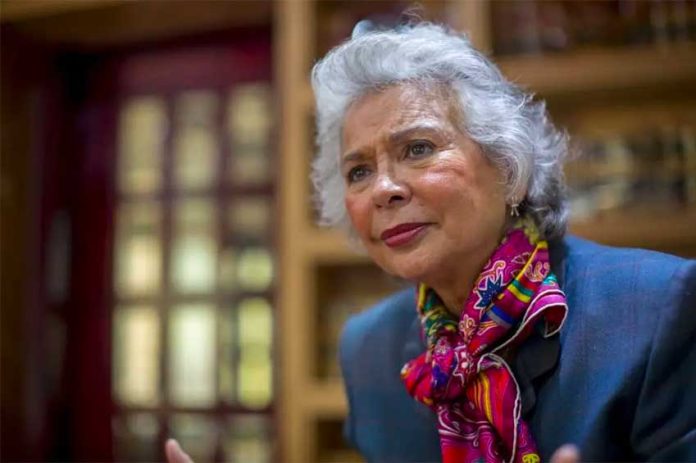The federal interior secretary has pledged to carry out a “general clean-up” of the National Immigration Institute (INM), explaining that the government has become aware of immigration agents who engage in “illegal conduct.”
Olga Sánchez Cordero told a press conference yesterday that the government has heard from people who have been extorted by immigration agents when they arrived in Mexico.
She added that there is evidence that INM officials even charge different “fees” if the person entering the country “is Venezuelan, Indian or Chinese – in a nutshell, it depends on the nationality.”
The interior secretary’s comments came in response to a question about a 2017 audit recently released by the Federal Auditor’s Office (ASF), which identified legal and ethical shortcomings at the INM and recommended a “profound reengineering” of the institute.
“We’re going to do a general clean-up. These ethical and legal voids it had, of course we’re reviewing them,” Sánchez said.
In response to the ASF audit, the INM itself also said that it would conduct an in-depth review of its processes as well as its staff and the treatment they provide to migrants.
The review will be carried out “from a perspective of unconditional respect for human rights,” the organization said.
The INM also said it will progressively change its personnel in the short term, while over a longer period it will modify its processes and develop new practices with a specific focus on the modernization of technology.
“In doing so, the intent is for the institute to be recognized as an agency that is world class in immigration processes. The modernization of the INM implies an open and transparent institute that maintains civil society as an ally,” it said.
Elba Coria, director of the Alaíde Foppa Legal Clinic for Refugees, an organization at the Iberoamerican University, said the ASF’s damning assessment of the INM was a result of the latter implementing a strategy to control Mexico’s borders and national territory with countless roadblocks and inspections, placing migrants in a situation of vulnerability.
Leticia Calderón Chelius, a researcher at Instituto Mora, a Mexico City university, highlighted that Mexico deports more Central Americans than the United States and contended that immigration authorities have acted unlawfully after arresting migrants.
“They detained everyone, and for longer than the legally allowed time. That was the strategy . . .” she said.
Both Coria and Calderón said that political will is needed to implement the changes that are needed to reform the INM.
The National Immigration Institute was also criticized in a 2017 report by the independent INM Citizens’ Council after an investigation found that agents threaten, punish and abuse migrants at detention centers, coerce them to accept voluntary deportation and discourage them from seeking asylum in Mexico.
Both President López Obrador and new INM chief Tonatiuh Guillén have promised that migrants will be treated with more respect and humanity under the new government than was the case during the previous one.
Migration to Mexico has surged in recent months as several large caravans of Central Americans have entered the country at the southern border en route to the United States.
The INM last month issued more than 12,000 humanitarian visas to such migrants but the program has since been discontinued.
Thousands of Central Americans are currently stranded in northern border cities as they await the opportunity to request asylum with United States authorities, a situation that has rankled some residents and authorities in cities such as Tijuana.
Migration continues to be a contentious issue in the bilateral relationship between Mexico and the United States, one that deteriorated after U.S. President Donald Trump took office in January 2017.
Secretary Sánchez and INM chief Guillén will travel to Washington D.C. later this week to meet with United States Homeland Security Secretary Kirstjen Nielsen to discuss the two countries’ views on migration and strategies to deal with the issue.
“. . . It’s a common issue that affects the United States, us and also Canada,” Sánchez said.
Source: Milenio (sp)
